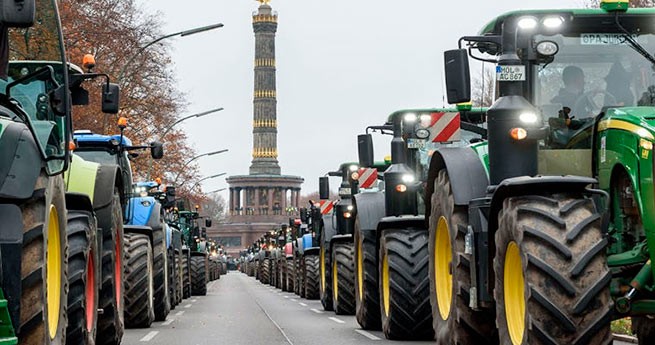German farmers are planning a traffic blockade across the country.
In Germany, farmers took to the streets and are preparing for what they say is an unprecedented mobilization on Monday. Or, to put it more simply, they are warning the Scholz government of a general strike because they are not prepared to pay for the price increases that they say his government has brought about.
Videos circulating on social media show the scale of the reaction, which surprisingly failed to generate media interest.
🔊 … music
Massive protests are being carried out by farmers in Germany against the government on January 8th.
The farmers in Germany are protesting due to unfair taxes and practices being carried out by the government.
Why don't we ever see this on the news?
🚨🚨🚨 pic.twitter.com/RNrYaDy35u
— Wall Street Silver (@WallStreetSilv) January 3, 2024
Mass protests by German farmers against the government will take place on January 8. They are protesting because of unfair taxes and government actions. Why don’t we ever see this on the news?
Similar developments are expected in France and Spain, where farmers are also opposing government decisions.
From 5 days ago. The media is afraid to show any footage of the protesting farmers in Germany. But we must share it. They are vital to our food supply. pic.twitter.com/HhgJEfQdUg
— Ryan Gerritsen🇨🇦🇳🇱 (@ryangerritsen) January 3, 2024
The media are afraid to show footage of protesting farmers in Germany. But we must share them. They are vital to our food supply.
As a result, the adventurous negotiations on the German budget for 2024, which began in November last year, come down to covering with cuts and austerity policies a hole in the budget of 17 billion euros left by sanctions against Russia, which, however, sharply increased prices for all types of goods in Germany, combined with the money given to Ukraine, which includes the return of excise tax on diesel fuel, a sum of 900 million euros per year, equivalent to 21 cents per liter of diesel fuel.
The amount is not small, since, according to economists, on average in Germany, a farm engaged in extensive agriculture loses about 3,886 euros, a livestock unit – about 3,238 euros, a vineyard – 935 euros, and an orchard – 1,052 euros.
In addition to the refunds, the budget includes the elimination of tax breaks for agricultural vehicles, all under the auspices of… pro-environmental practices – they are told to switch to donkeys and mules, except the Germans say they see donkeys in… parliament.
Germany is in the grip of agricultural protests, and next Monday, January 8, will mark an escalation of demonstrations that began in response to the removal of a related oil tax benefit, but are now taking on a broader social dimension.
Unions and associations operating in the road transport sector have already announced their intention to take part in a week of strikes called by the German Farmers’ Union, while workers on the country’s dense rail network are also preparing for further strikes from January 8.
In other words, it is possible that tractors, trucks and crowds of people will flood Berlin next week in a last-ditch attempt to force the Bundestag to reconsider part of the VAT cut for farmers when the partial implementation of the “debt brake” agreed earlier in December by the ruling coalition begins in the coming days.
⚡️ ⚠️ 𝐌𝐀𝐒𝐒𝐈𝐕𝐄 𝐏𝐑𝐎𝐓𝐄𝐒𝐓 🪧 Germany: A nationwide farmers protest is awaited if the government will not withdraw from their idea of introduce a vehicle tax for agricultural vehicles (diesel taxes).
From January 8th the protests will really start! The farmers in… pic.twitter.com/1WJtEayQAg
— {Matt} $XRPatriot (@matttttt187) January 3, 2024
“Enough is enough, the federal government’s plans to raise taxes must be scrapped.” – Joachim Ruckweid, President of the Farmers’ Union, commented on the X platform (formerly Twitter) on the eve of the New Year.
The week of action will culminate in a major demonstration in Berlin on January 15th. Be that as it may, the unfavorable situation in rural areas of Germany does not leave government officials indifferent, both at the federal level and in individual states. Sven Schulze, the Christian Democratic economics minister of Saxony-Anhalt, recently predicted in the Bild newspaper that “there is a threat of a terrible start to the new year” and it appears to be justified by the mobilization plans of farmers’ associations.
I think it's worth asking why the mainstream media remains silent on the massive farmer and blue collar uprising in Germany. pic.twitter.com/0djBogizo2
— Ian Miles Cheong (@stillgray) January 3, 2024
I think it’s worth asking why the mainstream media is silent about the massive uprising of farmers and workers in Germany*.
After an initial reaction that began in early December when Berlin’s Brandenburg Gate was blocked by tractors, farmers are still on the alert in several states across the country and have even moved to blockades and road closures in the last few days. A typical example was the protest in Berlin on December 22, when manure covered the road surface on Berlin’s main autobahn. Four days earlier, the same movement was repeated in front of the Victory Column in the center of the German capital.
*According to our colleagues from Germany, all major media outlets received letters from the government with an urgent request not to raise the topic of the farmers’ strike. The Germans are a disciplined people, and “Ordung” is ingrained into their subcortex. But there are still doubts that if farmers’ strikes begin, they will be able to completely hush up this issue.







More Stories
Paris: wild clashes between police and "black" block
Modern Germans are far from the most hardworking in Europe
Georgia: Opposition leaders were brutally beaten by security forces (video)